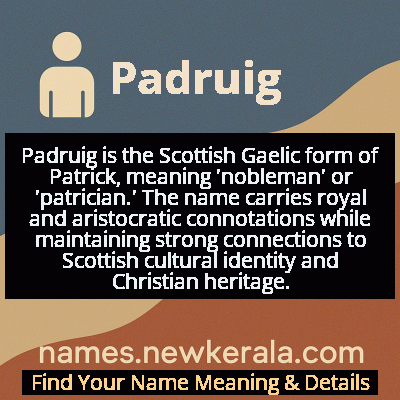Padruig Name Meaning & Details
Origin, Popularity, Numerology Analysis & Name Meaning of Padruig
Discover the origin, meaning, and cultural significance of the name PADRUIG. Delve into its historical roots and explore the lasting impact it has had on communities and traditions.
Name
Padruig
Gender
Male
Origin
Scottish
Lucky Number
4
Meaning of the Name - Padruig
Padruig is the Scottish Gaelic form of Patrick, meaning 'nobleman' or 'patrician.' The name carries royal and aristocratic connotations while maintaining strong connections to Scottish cultural identity and Christian heritage.
Padruig - Complete Numerology Analysis
Your Numerology Number
Based on Pythagorean Numerology System
Ruling Planet
Uranus (Rahu)
Positive Nature
Strong sense of order, loyal, practical, and disciplined.
Negative Traits
Stubborn, overly serious, rigid, and prone to feeling restricted.
Lucky Colours
Blue, gray.
Lucky Days
Saturday.
Lucky Stones
Blue sapphire.
Harmony Numbers
1, 7, 8.
Best Suited Professions
Managers, engineers, accountants, organizers.
What People Like About You
Dependability, discipline, practicality.
Famous People Named Padruig
Padruig Morrison
Traditional Musician
Renowned Scottish harpist and composer preserving Gaelic musical traditions
Padruig MacNeacail
Poet and Writer
Influential Scottish Gaelic poet and cultural advocate
Padruig Moireasdan
Political Figure
Notable Hebridean community leader and land rights advocate
Name Variations & International Equivalents
Click on blue names to explore their detailed meanings. Gray names with will be available soon.
Cultural & Historical Significance
The name represents a bridge between Scotland's Celtic past and its Christian transformation, embodying the resilience of Gaelic culture through centuries of political and social change. In modern times, Padruig has become symbolic of the Gaelic revival movement, representing cultural pride and linguistic preservation. It continues to be a meaningful choice for families wishing to honor their Scottish roots while participating in contemporary society.
Extended Personality Analysis
Individuals named Padruig are often perceived as possessing natural leadership qualities, combining traditional values with modern sensibilities. They typically demonstrate strong moral character, reliability, and a deep connection to their cultural roots. Many Padruigs are known for their diplomatic nature, able to navigate complex social situations with grace and wisdom.
There's often an artistic or creative streak present, whether expressed through music, writing, or other cultural pursuits. The name suggests someone who values heritage while embracing progress, making them effective bridges between generations and traditions. Padruigs are frequently seen as pillars of their communities—dependable, principled, and committed to preserving what matters while thoughtfully considering necessary evolution.
Modern Usage & Popularity
In contemporary Scotland, Padruig maintains a strong presence particularly in Gaelic-speaking communities and among families seeking to honor their Scottish heritage. While not among the most common names nationally, it enjoys steady usage and has seen a modest resurgence as part of the Gaelic language revival movement. The name is most popular in the Highlands, Islands, and among diaspora communities who wish to maintain cultural connections. Modern Padruigs often go by 'Paddy' or 'Pat' in informal settings while preserving the full Gaelic form for official purposes, reflecting the practical bilingualism common in Scottish naming traditions.
Symbolic & Spiritual Meanings
Symbolically, Padruig represents cultural continuity and the preservation of tradition in the face of modernization. The name embodies the concept of noble leadership that serves rather than dominates, reflecting Scotland's historical clan system where chiefs were expected to protect and provide for their people. It also symbolizes the integration of Christian values with Celtic identity, representing spiritual depth grounded in cultural authenticity. The name carries connotations of resilience, echoing Scotland's ability to maintain distinct cultural identity despite political and social pressures, while also suggesting the quiet strength that comes from deep-rooted heritage and principled living.

